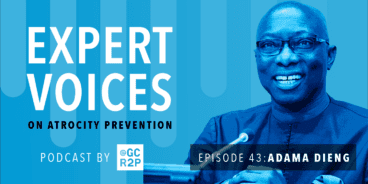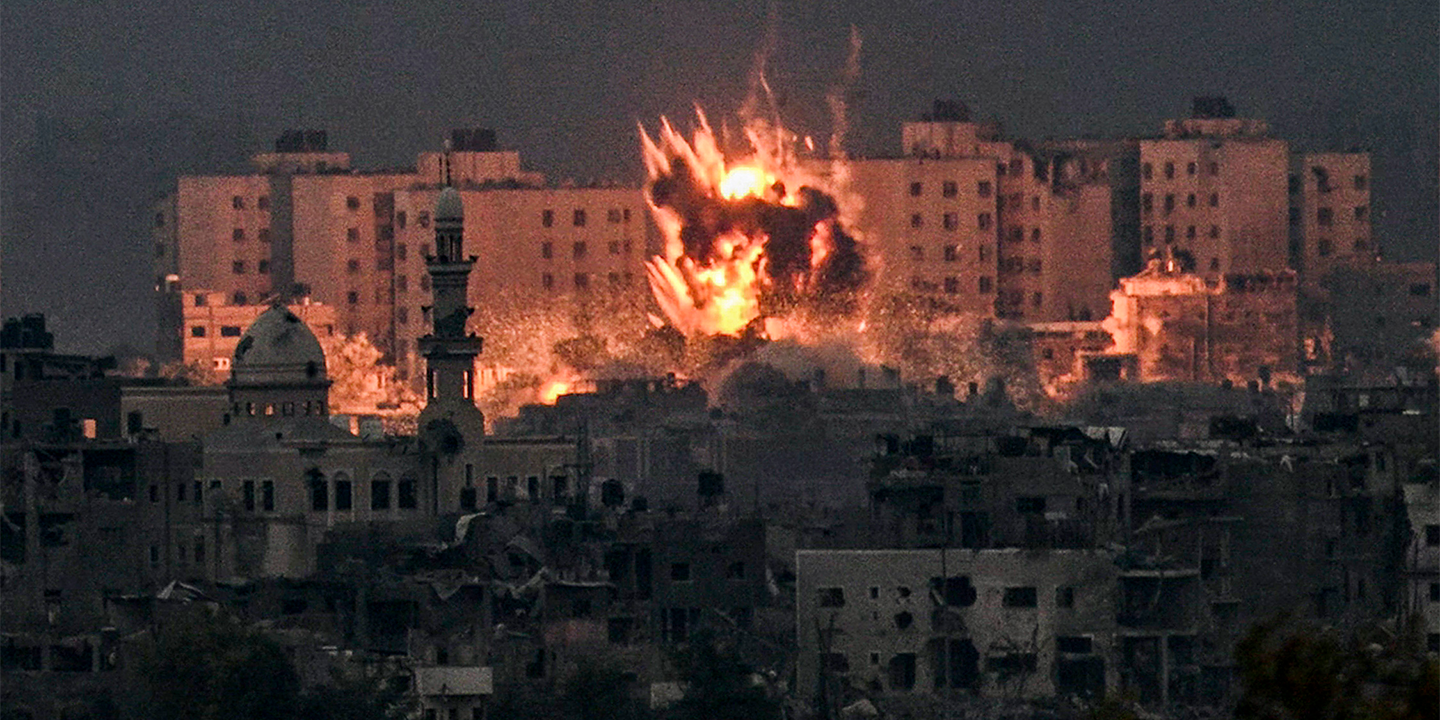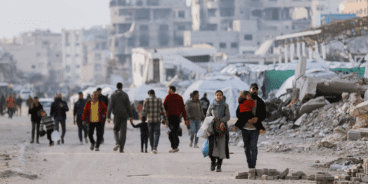

Atrocity Alert No. 370: Israel and the Occupied Palestinian Territory, DR Congo and South Sudan
Atrocity Alert is a weekly publication by the Global Centre for the Responsibility to Protect highlighting situations where populations are at risk of, or are enduring, mass atrocity crimes.
UN SECURITY COUNCIL DEADLOCKED AS ATROCITIES UNFOLD IN GAZA
Since 7 October more than 5,791 Palestinians have been killed and over 16,297 injured by Israeli airstrikes in Gaza, according to the Ministry of Health in Gaza. Relentless Israeli airstrikes continue to target civilians and destroy civilian objects, including residential buildings, hospitals, mosques, water and sanitation facilities and refugee and displacement camps, amounting to likely war crimes. According to the UN Office for the Coordination of Humanitarian Affairs, 43 percent of housing units in Gaza have been destroyed or damaged from airstrikes.
Despite growing civilian casualties, the UN Security Council (UNSC) remains deadlocked. On 16 October a draft resolution tabled by Russia called for an immediate humanitarian ceasefire but did not receive sufficient votes to pass. The subsequent draft resolution – tabled by Brazil on 18 October – called for humanitarian pauses and was vetoed by the United States (US). The UNSC is currently reviewing two further draft resolutions put forward by the US and Russia, respectively, and a vote is expected imminently.
Appeals for a humanitarian ceasefire and sustained safe passage of aid have been reiterated for days by several UN officials, including the Secretary-General. Humanitarian suffering is reaching catastrophic levels due to Israel’s bombardments and complete siege of Gaza. For 15 consecutive days, Gaza has had no electricity or flow of fuel. As a result, nearly two-thirds of all health facilities have stopped functioning, according to the World Health Organization (WHO) and the Ministry of Health in Gaza has warned that the healthcare system is completely out of service. Water and sanitation services are on the brink of collapse, while acute shortages of water, food and medicine are threatening the survival of millions.
On 17 October, at the request of US President Joe Biden, Israel agreed to allow the safe passage of some humanitarian aid into south Gaza via the Rafah Crossing from Egypt. Since then, only 54 trucks containing life-saving aid supplies have crossed into Gaza. The WHO has characterized the aid convoys as a “drop in the ocean of need” for the over 2 million Palestinians trapped in Gaza. UN officials have emphasized that at least 100 aid trucks per day are required to meet needs.
Israel’s bombardments and besiegement of Gaza came after Hamas and other Palestinian armed groups launched a deadly assault into Israel on 7 October. Militants attacked civilian areas and perpetrated violations of international law that likely amount to war crimes and crimes against humanity, including mass summary killings of civilians, abductions and hostage-taking and physical abuse. At least 1,400 Israelis have been killed and over 5,431 injured. Hamas continues to fire thousands of indiscriminate rockets towards Israel and at least 220 people – including Israeli and foreign nationals – are still held hostage in Gaza, according to Israeli authorities.
The UNSC’s inability to speak with a unified voice in defense of international law severely undermines the credibility of the international community. UN High Commissioner for Human Rights, Volker Türk, said, “This violence will never end unless leaders stand up and take the brave and humane choices that are required by fundamental humanity.”
During the upcoming Emergency Special Session on Israel and Palestine in the UN General Assembly to be held tomorrow, 26 October, all member states must call for an immediate humanitarian ceasefire. All parties to the conflict must take immediate steps to comply with their obligations under international law, including those for the protection civilians and civilian objects. Israel must immediately cease its siege of Gaza and its collective punishment of the Palestinian people.
POPULATIONS IN EASTERN DR CONGO FACE INTENSIFYING VIOLENCE AND MASS DISPLACEMENT
After six months of precarious calm in the Democratic Republic of the Congo’s (DRC) North Kivu Province, intense clashes have renewed between pro-government armed groups and fighters from the March 23 Movement (M23) armed group. Since the beginning of October, hostilities have escalated, with continuous fighting in Masisi and Rutshuru territories claiming dozens of lives and forcibly displacing nearly 200,000 people. On 21 October M23 reportedly captured the town of Kitshanga in Masisi Territory and burned several homes during the clashes. According to Radio Okapi – a radio managed by the UN peacekeeping mission in the DRC (MONUSCO) – civil society fears reprisals against civilians accused of collaborating with pro-government armed groups. MONUSCO has reinforced its presence to protect the civilians remaining in Kitshanga.
The risks to civilians and civilian infrastructure are increasing as conflict nears populated urban areas. Fighting has reportedly intensified around Goma, North Kivu’s capital, with both sides exchanging heavy fire.
Since the resurgence of M23 in late November 2021, civilians and critical civilian infrastructure in eastern DRC have faced increased risk. M23 has committed widespread abuses against civilians, including deliberate killings, rape and indiscriminate shelling, among other possible war crimes. Human Rights Watch has also documented myriad abuses perpetrated by local armed groups backed by units of the Congolese armed forces.
Elsewhere in North Kivu, alleged militants from the Allied Democratic Forces (ADF) armed group killed 26 civilians with machetes in an attack in Oicha, the capital of Beni Territory, on 23 October. Among the victims were seven members of the same family who were killed in their house. According to Radio Okapi, tensions remain high and there is significant FARDC and police presence in Oicha. For years, the ADF has perpetrated recurrent atrocities and retaliatory attacks against civilians. Since the start of 2023 ADF attacks in North Kivu have killed and injured hundreds of civilians.
Incessant violence by a multitude of armed groups has resulted in more than 2.3 million Congolese displaced in North Kivu alone. Those displaced are facing urgent needs for food, water, shelter and health care; however, ongoing hostilities and insecurity have impeded humanitarian access to vulnerable populations. Displaced women and girls have been at particularly heightened risk of sexual violence in and around displacement camps.
Christine Caldera, DRC expert at the Global Centre for the Responsibility to Protect, said, “All armed groups in the DRC must cease perpetrating senseless attacks on civilian populations and respect their obligations under International Humanitarian Law.” M23 should immediately and fully withdraw from occupied areas. The protection of civilians must be paramount as the government works to address the ongoing threat posed by the ADF, M23 and other armed groups. The Congolese government, with the support of international donors, should urgently provide medical and psychosocial services for displaced people.
SYSTEMATIC REPRESSION JEOPARDIZES CHANCES FOR PEACE AND ELECTIONS IN SOUTH SUDAN
On 5 October the UN Human Rights Council-mandated Commission on Human Rights in South Sudan (CHRSS) released a Conference Room Paper which examined entrenched repression and the systematic curtailment of democratic and civic space in South Sudan. Based on interviews with civil society activists and members of the media, as well as an analysis of material publicly available, the CHRSS concluded that civic and political space has “virtually disappeared” amidst systematic repression of the media, human rights defenders (HRDs) and civil society in South Sudan.
Since 2017 the CHRSS has consistently documented a “relentless policy” of harassment against journalists and media, particularly against those that are perceived to be critical or negative of the authorities. According to the report, journalists are being attacked and denied access to information, and the National Security Service (NSS) has instituted “a pervasive and unlawful censorship regime to curtail independent media.” The NSS has also imposed widespread restrictions and surveillance on HRDs and civil society and routinely interferes with their activities.
Severe restrictions on civic and political space impact the future of South Sudan’s democracy, peace and stability. At a time when the country is still led by transitional authorities, there have been diminishing opportunities for civilians to participate in constitution-making, transitional justice, national elections and other essential democratic processes, which may give rise to grievances and increase the risk of atrocity crimes. As South Sudan is preparing for elections in 2024, the Commissioners underlined that “only by nurturing an accountable system of government can a genuinely democratic society be built, which overcomes the history of violent power contestation.”
Throughout the transitional period, political leaders have continued to focus on preserving their own personal power, allowing mistrust to reinvigorate ethnic tensions and fuel violence across the country. Continuous political competition and mobilization of armed groups is leading to increasing localized conflict, fragmentation and widening of ethnic divisions.
While national elections were initially scheduled for 2022, the Transitional Government of National Unity (TGoNU) has repeatedly extended the transitional period and delayed the elections. Earlier this year, several politicians and civil society actors warned of potential rigging of elections and increased politicization along ethnic lines. During September, the UN Secretary-General released a report on South Sudan that noted that the requisite legal frameworks and relevant institutions for credible elections are not yet in place. The Secretary-General stressed that, “agreeing on these critical tasks does not require financial resources, but political will and a spirit of compromise to move forward in an inclusive manner.”
Juliette Paauwe, South Sudan expert at the Global Centre for the Responsibility to Protect, said, “The TGoNU must urgently mitigate the risk of atrocities around upcoming elections by guaranteeing civic and political space, as well as the inclusive participation of civilians in essential democratic processes.” The TGoNU should immediately complete all necessary preparations for the national elections and the constitution-making process, particularly the appointment of the National Constitutional Review Commission.
Related Content


Atrocity Alert No. 434: Sudan, Ethiopia and the UN Human Rights Council
